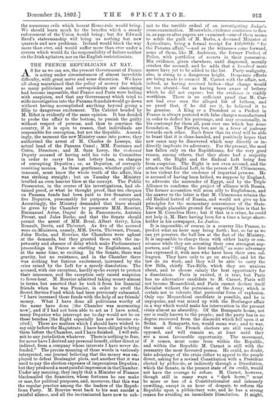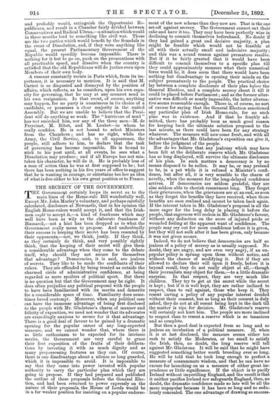THE FRENCH REPUBLICANS AT BAY.
AS far as we can see, the present Government of France is acting under circumstances of almost incredible difficulty, with great nerve and some discretion. We have all along maintained that the policy of secrecy for which so many politicians and correspondents are clamouring had become impossible, that France and Paris were boiling with suspicion, and that any Government which tried to stifle investigation into the Panama Scandals would go down without having accomplished anything beyond giving a fillip to dangerous excitement. The Cabinet headed by M. Ribot is evidently of the same opinion. It has decided to probe the affair to the bottom, to punish the guilty without respect of persons, and thus to convince the country, if it is open to reason, that individuals are responsible for corruption, but not the Republic. Accord- ingly-, the moment the new Ministry came into power, they authorised the arrest of M. Charles de Lesseps, the actual head of the Panama Canal ; MM. Fontanes and Cottu, Directors ; and M. Sans Leroy, the ci-devant Deputy accused of having sold his vote in Committee in order to carry the last lottery loan, on charges of corrupting Deputies ; or, as Deputies, of corruptly receiving monies. As these gentlemen, whether guilty or innocent, must know the whole truth of the affair, this was striking straight ; but on Tuesday the Ministry levelled an even heavier blow at the corrupt. The Public Prosecutor, in the course of his investigations, had ob- tained proof, or what he thought proof, that ten cheques on Panama funds had been paid to five Senators and five Deputies, presumably for purposes of corruption. Accordingly, the Ministry demanded that leave should be given by the Chamber to prosecute MM. Rouvier, Emmanuel Arene, Duoeie de la Fauconnerie, Antonin Proust, and Jules Roche, and that the Senate should permit the arrest of MM. Beral, Albert Grevy, Leon Renault, Deves, and Thevenet. As five of the accused were ex-Ministers, namely, MM. Deves, Thevenet, Proust, Jules Roche, and Rouvier, the Chambers were aghast at the demands, but they granted them with the im- petuosity and absence of delay which make Parliamentary proceedings in France so startling to Englishmen, and at the same time, so exciting. In the Senate, there was gravity, but no resistance, and in the Chamber there was nothing but furious excitement, increased by the cries raised by the Left for a speedy dissolution. The accused, with one exception, hardly spoke except to protest their innocence, and the exception only raised suspicion to fever-heat. M. Bouvier admitted taking money almost in terms, but asserted that he took it from his financial friends when he was Premier, in order to swell the Secret Service Fund which had been previously exhausted. "I have increased these funds with the help of my friends' money. What I have done all politicians worthy of the name have done [the Chamber was murmuring now], and if I had not been able to act as I have acted, many Deputies who interrupt me to-day would not be on these benches [the Right especially has now become ex- cited]. These are matters which I should have wished to say only before the Magistrate. I have been obliged to bring them before the Chamber, and I have finished. I will sub- mit to any jurisdiction whatever. There is nothing to fear, for never have I derived any personal benefit, either direct or indirect, from a company whose interests I have never de- fended." The precise meaning of these words is variously interpreted, one journal believing that the money was em- ployed to defeat Boulangist plots, and another that it was used to pay the election expenses of impecunious Deputies ; but they produced a most painful impression in the Chamber. Under any meaning, they imply that a Minister of Finance blackmailed the financiers, whose fortunes he can make or mar, for political purposes, and, moreover, that this was the regular practice among the the leaders of the Repub- lican Party. M. Rouvier went back to his seat amidst a painful silence, and all the incriminated have now to sub- mit to the terrible ordeal of an investigating Judge's cross-examination. Meanwhile, evidence continues to flow in, asr papers after papers are examined—one of them seems to settle the guilt of M. Barbe, a deceased Minister of Agriculture, being a formal receipt for 450,000 fr. "for the Panama affair,"—and as the witnesses come forward, some of them, like M. Andrieux, the former Prefect of Police, with portfolios of secrets in their possession. His evidence, given elsewhere, until disproved, morally crushes the accused, and he adds that a hundred more names have yet to be added to the list. Party malignity, also, is rising to a dangerous height. Desperate efforts are being made to connect M. Carnot with the affair, not, indeed, as having received bribes—that charge would be too absurd—but as having been aware of bribery which he did not expose ; but the evidence is visibly worthless. There is no sufficient proof that M. Car- not had ever seen the alleged list of bribees, and no proof that, if he did see it, he believed it to be genuine. A King or a President or a Prefect in France is always pestered with false charges manufactured in order to deflect his patronage, and may occasionally, in his contempt for them all, pass over one which has some foundation. The Parties, too, are in a fever of jealousy towards each other. Each fears that its rival will be able to boast that it is clean-handed, and positively hopes that new cases may be discovered which may directly or in- directly implicate its adversary. For the present, the mud has fallen only on the Republicans, for the very good reason, among others, that they alone had a majority to sell, the Right and the Radical Left being free from suspicion. The Right is not even accused, and the attack on the Radical Left, in the person of M. Clemenceau, is too violent for the credence of impartial persons. He is accused of having been bribed, we suppose by England, to advocate the surrender of Egypt, and by the Triple Alliance to condemn the project of alliance with Russia. The former accusation will seem silly to Englishmen, and the answer to the latter is that M. Clemenceau retains the old Radical hatred of Russia, and would not give up his principles for the momentary convenience of the State. The single plausible ground for suspecting him is that be knew M. Cornelius Herz ; but if that is a crime, he could not help it, M. Herz having been for a time a large share- holder in his newspaper, La Justice.
It is impossible, of course, in a country like France, to predict what an hour may bring forth ; but, so far as we can yet perceive, the ball lies at the feet of the Ministry. It is impossible to charge them with either laxity or con- nivance while they are arresting their own strongest sup- porters, and "filling the first tumbril," as some adversary has expressed it, with men who have been their own col- leagues. They have only to go on steadily, and let the law do its work, and they will be able to carry the few Bills, chiefly Tax-Bills, which they are anxious about, and to choose calmly the best opportunity for a dissolution. Paris is excited, it is true, but Paris has no alternative candidate to M. Carnot, Paris will not become Monarchical, and Paris cannot declare itself Socialist without the permission of the Army, which is certain not to tolerate that particular form of explosion. Only one Monarchical candidate is possible, and he is unpopular, and was mixed up with the Boulanger affair in a way which would make his intervention in the present crisis almost an absurdity. Of the Bonaparte house, not one is really known to the people ; and the party has in no degree recovered from the discredit which fell upon it at Sedan. A Bonaparte, too, would mean war ; and to war, the mass of the French electors are still resolutely opposed, and will remain so, at least until they see a most favourable opportunity. The movement, if it comes, must come from within the Republic, and within the Republic M. Carnot is still with the peasantry the most favoured person. He could, no doubt, take advantage of the crisis either to appeal to the people direct, asking for a revised Constitution with a President elected by plebiscite, or indirectly through a Dissolution, which the Senate, in the present state of its credit, would not have the courage to refuse. M. Carnot, however, though still in many ways a "dark horse," must be more or less of a Constitutionalist and intensely unwilling, except in an hour of despair, to reform the Republic upon a plebiscitary vote, and he has a strong reason for avoiding an immediate Dissolution. It might, and probably would, extinguish the Opportunist Re- publicans, and result in a Chamber fairly divided between Conservatives and Radical Ultras,—a situationwhich would in three months lead to something like civil war. Those are the two parties which would benefit by the Scandals in the event of Dissolution, and, if they were anything like equal, the present Parliamentary Government of the Republic would speedily become impossible. There is nothing for it but to go on, push on the prosecutions with all practicable speed, and dissolve when the country is satisfied that the old Republicans will do justice even upon Members of their own body. A rumour constantly recurs in Paris which, from its im- portance, it is necessary to mention. It is said that M. Carnot is so disgusted and dismayed by the position of affairs, which reflects, as he considers, upon his own capa- city for governing, that he may at any moment send in his own resignation. In that event, of course, anything may happen, for no party is unanimous in its choice of a candidate, or possesses a clear majority in the united Assembly. But we are unable to believe that the Presi- dent will do anything so weak. The " hurrinne of mud" has not smirched him, nor any of the three men—M. de Freycinet, H. Ribot, and. M. Loubet—in whom he really confides. He is not bound to select Ministers from the Chambers ; and has no right, while the Army, the Civil Service, and, to all appearance, the people, still adhere to him, to declare that the task of governing has become impossible. He is bound to stick to his post until, at all events, he sees what a Dissolution may produce ; and if all Europe has not mis- taken his character, he will do it. He is probably less of a man of action than he was at first supposed to be ; but there has been nothing in his five years of office to suggest that he is wanting in courage, or entertains too low an idea of what is due either to his own great position or to France.



































 Previous page
Previous page